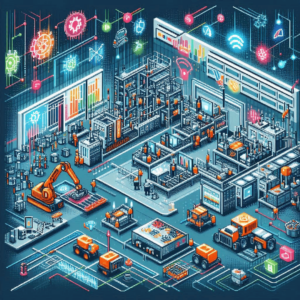Opportunities and Challenges in Smart Manufacturing

1. Introduction to Smart Manufacturing and Continuous Integration
Smart manufacturing represents a transformative approach in the manufacturing sector. It leverages advanced technologies like Artificial Intelligence (AI), the Internet of Things (IoT), and data analytics to optimize production processes. As a key component of Industry 4.0, this shift enhances flexibility, efficiency, and responsiveness to market demands. Thus, manufacturers in the UAE can produce customized products at scale. The principles of continuous integration streamline and automate development and deployment processes within smart manufacturing systems. However, transitioning to smart manufacturing presents significant challenges that must be addressed.
2. Opportunities in Smart Manufacturing
2.1 Enhanced Flexibility and Customization
One primary opportunity of smart manufacturing in the era of Industry 4.0 is the ability to produce customized products efficiently. Traditional systems often focus on mass production of standardized goods. In contrast, smart manufacturing adjusts dynamically to varying customer demands. This allows for small-batch production and personalized products. Technologies like AI-driven resource scheduling facilitate this flexibility, contributing to continuous delivery and deployment in DevOps. By integrating Industry 4.0 principles, manufacturers leverage automation, IoT, and real-time data analytics to enhance adaptability and responsiveness in production.
2.2 Improved Operational Efficiency
Smart manufacturing leverages real-time data analytics to optimize production processes. By integrating IoT devices, companies can monitor equipment performance and track production metrics. This data-driven approach enables predictive maintenance, reducing downtime and maintenance costs. AI algorithms analyze historical data to forecast demand and enhance supply chain efficiency. Organizations can further optimize operations by adopting cloud migration strategies on AWS.
2.3 Increased Collaboration and Integration
2.4 Sustainability and Resource Efficiency
Smart manufacturing promotes sustainability by optimizing resource utilization and minimizing waste. Advanced analytics identify resource consumption inefficiencies, allowing manufacturers to reduce energy usage and material waste. Real-time monitoring enables companies in the UAE to implement sustainable practices throughout their operations. This focus on sustainability benefits the environment and enhances brand reputation.
2.5 Workforce Empowerment and Skill Development
3. Challenges in Smart Manufacturing
3.1 High Implementation Costs
One significant challenge is the high cost of implementing smart manufacturing technologies. Upgrading machinery, investing in new technologies, and training personnel require substantial financial resources. This may be a barrier for small and medium-sized enterprises (SMEs). Additionally, integrating legacy systems with new technologies complicates the transition process.
3.2 Data Security and Privacy Concerns
As smart manufacturing systems become interconnected in the era of Industry 4.0, the risk of cyberattacks increases. Manufacturers must ensure sensitive data is adequately protected. Implementing robust cybersecurity measures and data encryption protocols is essential. Furthermore, compliance with data protection regulations in the UAE adds complexity to managing manufacturing data.
3.3 Technology Integration and Interoperability
Successful smart manufacturing relies on the seamless integration of various technologies. However, achieving interoperability among diverse systems can be challenging. Manufacturers must address compatibility issues and establish standardized protocols. This challenge is pronounced in industries with a mix of legacy and modern systems, necessitating a careful cloud migration strategy on AWS.
3.4 Skill Gaps and Workforce Resistance
While transitioning to smart manufacturing offers workforce development opportunities, it also presents challenges related to skill gaps. In the era of Industry 4.0, many employees may lack the skills to operate advanced technologies, necessitating comprehensive training. Some workers may resist adopting new technologies due to fears of job displacement. Addressing these concerns through effective communication is crucial to ensuring a smooth transition and maximizing the benefits of smart manufacturing.
3.5 Complexity of Data Management
Smart manufacturing generates vast amounts of data from various sources. Managing and analyzing this data can overwhelm manufacturers. To derive actionable insights, companies must invest in advanced analytics tools. Ensuring data quality and accuracy is critical for making informed decisions, especially when integrating systems across a hybrid and multi-cloud landscape.
4. Conclusion
Smart manufacturing presents opportunities for enhancing flexibility, efficiency, and sustainability in production processes. However, transitioning to this advanced paradigm, a key aspect of Industry 4.0, is not without challenges. Manufacturers must navigate high implementation costs, data security concerns, and skill gaps. Leveraging big data analytics can help address these challenges by providing actionable insights, optimizing operations, and improving decision-making. By proactively integrating these advanced technologies and adopting robust strategies, companies can harness the full potential of smart manufacturing. Embracing these Industry 4.0 principles positions manufacturers in the UAE to thrive in today’s dynamic environment.
For more information on how Cloudastra Technologies can assist with software services, please visit our website. We are here to help with your business inquiries.
Do you like to read more educational content? Read our blogs at Cloudastra Technologies or contact us for business enquiry at Cloudastra Contact Us.